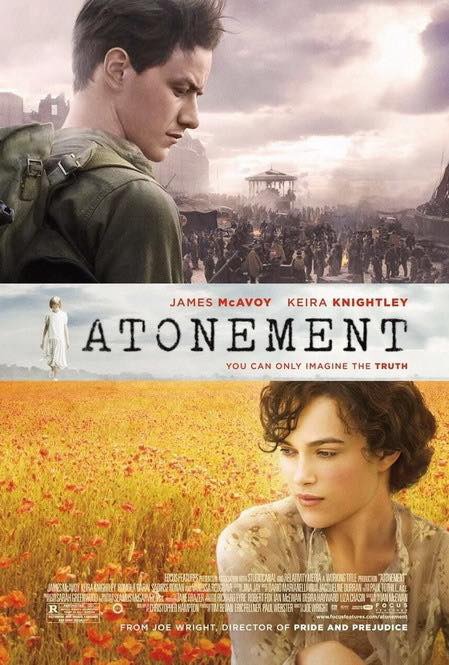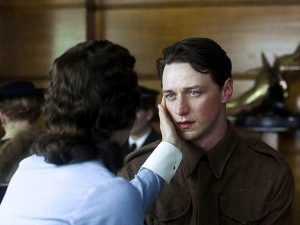Atonement (2007)

Atonement (2007), directed by Joe Wright and based on the bestselling novel by Ian McEwan, is an intricate, emotionally charged drama that explores the themes of love, guilt, class, and the consequences of a single lie. With stunning performances, exquisite cinematography, and a haunting score, Atonement is a cinematic masterpiece that lingers in the heart and mind long after the credits roll.
Suggested videos for you:
Plot Overview
The film is divided into three distinct acts, each presenting a different perspective on the central event: a young girl’s misunderstanding that changes the lives of two lovers. The story begins in 1935 at the Tallis family estate in Surrey, England, where 13-year-old Briony Tallis (Saoirse Ronan) is an aspiring writer. She has just witnessed an innocent and private encounter between her older sister Cecilia (Keira Knightley) and Robbie Turner (James McAvoy), the son of the family’s housekeeper. Briony misinterprets their interaction and, later, misinterprets another, much more tragic event, leading her to accuse Robbie of a crime he did not commit.
Robbie, who is from a lower socioeconomic background, has been in love with Cecilia for years, and their relationship is blossoming despite the constraints of class and family expectations. Briony’s accusation of rape, which she later regrets but cannot undo, results in Robbie being convicted and sent to prison. Cecilia, devastated by the false accusation, ends her relationship with her family and stays loyal to Robbie, but they are separated by forces beyond their control.
The second act of the film follows Robbie’s time in prison and his eventual enlistment in the British Army during World War II. He is sent to fight in France, and this portion of the film captures both his internal emotional journey and the physical horrors of war. Meanwhile, Briony, now a young adult and a burgeoning writer (played by Romola Garai), attempts to atone for the damage she caused by reaching out to those she wronged, particularly Cecilia and Robbie.
The final act of Atonement reveals the devastating cost of Briony’s actions. It is here that the film’s most heartbreaking twist is unveiled, challenging the audience’s understanding of the entire story. This twist changes the tone of the narrative and forces a reevaluation of what has come before, leaving a sense of tragic inevitability.
Themes and Symbolism
Atonement explores several complex themes, but at its heart is the idea of atonement itself—the need to make amends for one’s mistakes, the guilt of an irreversible wrong, and the personal reckoning that follows. Briony’s journey is at the center of the story, but it is also a story about the larger consequences of false accusations, societal expectations, and the lasting impact of trauma.
The theme of class is also crucial to the narrative. Robbie and Cecilia’s love affair transcends the rigid boundaries of class, as Robbie is a working-class man trying to break into the world of the privileged. The novel’s exploration of this tension is echoed in the film, where Robbie’s love for Cecilia is shown to be both a rebellion against societal norms and an expression of true emotional intimacy. However, the class divide becomes a significant factor in the unfolding tragedy, as Cecilia’s family, particularly her mother, disapproves of the relationship because of Robbie’s background.
Atonement also meditates on the relationship between fiction and reality. Briony’s decision to become a writer is a form of self-redemption, but it is also a way for her to control the narrative and manipulate reality to her liking. This exploration of the power of storytelling is critical to understanding the film’s structure and its conclusion, where the line between what is real and what is imagined becomes increasingly blurred.
The metaphor of “atonement” is explored visually in several ways. One notable example is the recurring motif of water—whether it is the flowing river that separates Cecilia and Robbie, or the overwhelming waves of guilt that threaten to drown Briony. The imagery of water suggests a cleansing or a need for purification, yet in the case of Briony, it also represents the enormity of the guilt that she can never fully wash away.
Characterization and Performances
The characters in Atonement are deeply flawed and human, which makes the emotional stakes all the more poignant. Briony, as played by Saoirse Ronan (young) and Romola Garai (adult), is both sympathetic and maddening. Her impulsive decision to accuse Robbie, while born from a misunderstanding, is a devastating one that sets the tragedy in motion. As the film progresses, Briony grapples with the consequences of her actions and the moral complexities of atonement. Ronan’s portrayal of the younger Briony is particularly remarkable, as she effectively conveys a sense of naivety and unintentional cruelty. Garai, as the older Briony, brings a more somber, reflective quality to the character, and her scenes reveal the depth of the internal anguish Briony must face.
Keira Knightley delivers one of her best performances as Cecilia, a woman torn between her loyalty to Robbie and the disapproval of her family. Knightley captures Cecilia’s strength, vulnerability, and determination, portraying her as a woman who is fully aware of the societal and familial constraints she faces but refuses to let them dictate her happiness.
James McAvoy’s portrayal of Robbie is heartfelt and complex. He perfectly embodies the character’s transformation from an earnest, love-struck man into a hardened soldier, all the while maintaining a sense of dignity and inner strength. McAvoy has a natural chemistry with Knightley, making the love story between Cecilia and Robbie feel both genuine and tragic.
The supporting cast is equally strong, with notable performances from Vanessa Redgrave, who appears in the final moments of the film, and Brenda Blethyn as Cecilia’s mother, whose coldness contrasts sharply with the emotional warmth that Cecilia and Robbie share.
Cinematography and Direction
Joe Wright’s direction is one of the key reasons Atonement works as well as it does. His meticulous attention to detail, the way he captures the emotion of the characters through intimate close-ups, and his ability to maintain the film’s dreamlike tone all contribute to its emotional power. The cinematography by Seamus McGarvey is nothing short of spectacular, with lush, painterly shots that evoke the period setting while heightening the emotional intensity. The most memorable sequence in the film is undoubtedly the extended tracking shot on the beaches of Dunkirk, which lasts for several minutes and captures the chaos and horror of war in a single, breathtaking take. This shot is a testament to Wright’s ability to blend technical precision with emotional depth.
Soundtrack and Music
The film’s score, composed by Dario Marianelli, is beautifully evocative. The music is both sweeping and intimate, perfectly complementing the film’s emotional arc. The recurring use of a piano motif, in particular, becomes a symbol of Cecilia and Robbie’s love, as well as the film’s central themes of memory and regret. The score also plays a key role in building tension and heightening the emotional resonance of key scenes.
Final Thoughts
Atonement is a deeply moving film that explores the consequences of a single, life-altering mistake, and the ways in which we attempt to seek redemption. It’s a story about love, betrayal, and the ways in which fiction can sometimes offer the only path to healing. The performances, direction, and cinematography combine to create a hauntingly beautiful experience that leaves a lasting impact. It is a film that rewards repeated viewings, as the complexity of its narrative and the emotional depth of its characters unfold with each watch.
In the end, Atonement is a cinematic exploration of the human need for absolution, the heavy burden of guilt, and the devastating effects of one moment’s misjudgment. It is a meditation on love lost, lives broken, and the irreparability of certain actions. As the final moments reveal, sometimes atonement is impossible, and the only way forward is to live with the consequences.











